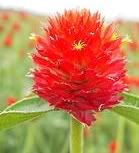Amaranth is a noun with a few different meanings:
- Any of various annuals of the genus Amaranthus having dense green or reddish clusters of tiny flowers and including several weeds, ornamentals, and food plants. Also called pigweed.
- An imaginary flower that never fades.
- A deep reddish purple to dark or grayish, purplish red.
- A dark red to purple azo dye.
 A globe amaranth. Photo by yoppy.
A globe amaranth. Photo by yoppy.It’s a poetic word with a rich background. Just as the rose is a symbol of love, the amaranth is a symbol of immortality. See Wikipedia’s section on the Myth, Legend and Poetry of the amaranth for some literary examples.
The Mavens’ Word of the Day has an interesting article on the history of amaranth:
English amaranth, which first appeared in the 16th century, came from Latin amarantus, meaning not just 'flower', but 'an unfading flower'. The Greek word from which Latin amarantus derived is amarantos which is formed from the prefix a- meaning 'not' (called the "alpha privative") plus marainein meaning 'to wither or decay'. The Indo-European root of this word, mer- meaning 'to die', is also the source of such words as "mortal, murder," and "mortgage."
And for all of you health-food addicts, amaranth grain is apparently very healthy. :P Yum!